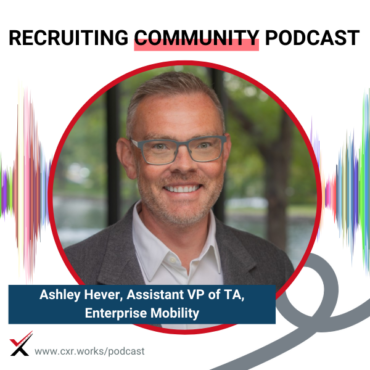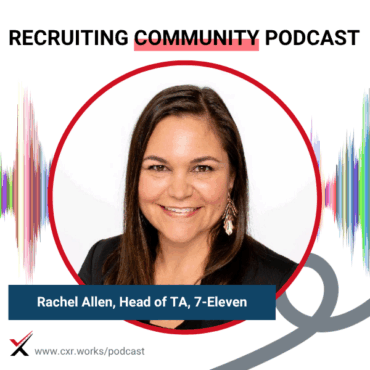
S5 E23 | Recruiting Community: Marcus Thorpe & Transparency in Recruiting
Hoyt connects with Marcus Thorpe to talk about what transparency means in today’s world of recruitment.
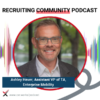 play_arrow
play_arrow
 play_arrow
play_arrow
Transforming High-Volume Hiring at 7-Eleven Cami Grace
 play_arrow
play_arrow
From Early Childhood to Talent Tech: Allyn Bailey’s Career Crossroads Cami Grace
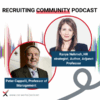 play_arrow
play_arrow
In Praise of the Office Cami Grace
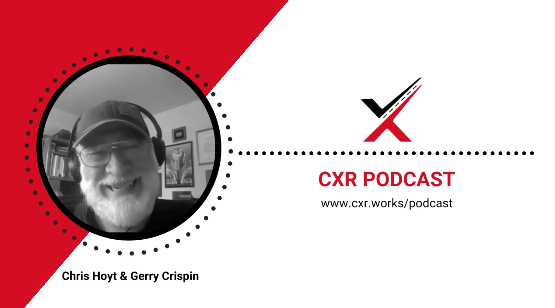
Welcome to the CXR channel, our premier podcast for talent acquisition and talent management. Listen in as the CXR community discusses a wide range of topics focused on attracting, engaging and retaining the best talent. We’re glad you’re here.
Chris Hoyt, CXR 0:20
Welcome, everybody to another CareerXroads podcast. That’s what we’re doing today isn’t a Gerry. It’s podcast.
Gerry Crispin, CXR 0:26
Absolutely.
Chris Hoyt, CXR 0:27
Live podcast, with nothing particular to talk about. So we just we thought we’d get on here and wax a little poetic that might work.
Gerry Crispin, CXR 0:39
I’m glad you continue after wax to. Great, thank you.
Chris Hoyt, CXR 0:46
What else would you wax Gerry?
Gerry Crispin, CXR 0:48
I have no idea. That’s I told you before, I have no game.
Chris Hoyt, CXR 0:53
Oh, you’ve got game. You got game. So we were I tell you what is interesting. We were talking about mentorship earlier. And that has been a topic for us. We’ve been doing some work with the CXR Foundation, the nonprofit that we formed last year, we’re pretty excited. We’ve got some stuff coming up. It’s all focused on like this, this aspect of internal ability mentors and mentees. And you had a you gearing up for panel that we’re also doing on September 1, with Atap for global talent, talent acquisition Appreciation Day. And and you sent a note to the panelists that said, let’s talk about when you were a mentor, or when you were a mentee, make an example in your life when you were a mentee. And these are leaders that are on the panel, this is a serious, serious panel. So is there some, I want to get your viewpoint on this before I before I sort of do a big reveal here, is there some aspect of that that is most interesting for you?
Gerry Crispin, CXR 2:03
Without a doubt because I do think no matter how experienced you are or look to others, you you basically should still be and I think the best people still are learners. And fundamentally, they started somewhere, they really truly started somewhere to begin to get advice and help. And they were probably fearless about going after that. And, and so they were totally unafraid to be able to say to someone, for this moment in time, you know, help me help me think through what I’m trying to accomplish. And I believe a great mentor is somebody who is also ongoing a mentee, but knows how to acquire that information knows where that information is, or at least makes an attempt to get that. So so I really was focusing in on tell me a story of how way back when you had an issue that you needed to resolve and you reached out to someone, and they helped you. And even though that person may have gone away, they you know, for that moment, they were the mentor or coach or advisor or, or whatever. I don’t know what the terms are. I hate that I really don’t like the term mentor. because fundamentally, it reflects something that’s much more long term. And I do think we’re, we’re kind of in the moment these days.
Chris Hoyt, CXR 3:42
So if I have done if I understand correctly, if I have done some mentoring, even if it was only in a single conversation, have I technically been a mentor?
Gerry Crispin, CXR 3:55
If it’s it, yes, without a doubt, technically, I don’t I mean, that’s how I would define it. It may be defined in the dictionary a lot differently that you know, over time you’ve taken care of them and followed them and whatever. And yes, we do build relationships with people that are lifelong. But I do think that even in those situations, the relationship shifts from, you know, mentor to peer to colleague to whatever. So, so I you know, I have hundreds of mentors.
Chris Hoyt, CXR 4:31
Yeah, well, I mean, that bodes it bodes well for the argument that mentor is kind of a shitty term. Like I don’t like that term either. I much prefer sort of like a because I think there’s an easy role reversal to between two very strong people who may be sharing are coaching each other, right. Like I may come to you for some coaching at one time and you may come back to me for an ask or coaching some daily.
Gerry Crispin, CXR 4:55
Daily I need coaching from you. Kim is my coach on on a whole bunch of stuff. So, but the reality is if you’re, if you’re comfortable in your skin and engaging others, and you actually demonstrate that you care about helping others, others are more comfortable coming to you for those things that you can help them with. And if you can’t, you just say I can’t. But here’s a suggestion on some people that might help you. And I think that’s what we want to surround ourselves with. And fundamentally, that’s all I’ve been interested in, surrounding myself with, for the majority of my career,
Chris Hoyt, CXR 5:38
Well, and if you’ve ever been part of, or seeing the execution of a mentor program, like I’m one of those ones, we have the scheduled calls and the ongoing, you know, I would argue that I wonder if those days are gone. And we are in more of a into your point. And in this moment, rapid fire, you know, almost ad hoc,
Gerry Crispin, CXR 6:01
I think the 21st century requires that we rethink this. So let me give you an example of what I did 45 years ago, and and it’s not that boring, it’s just old school. So I would I would read or hear about someone who was extraordinary in terms of being able to help me solve a problem, but I didn’t have access to that individual directly. And in those days, what you had to do was send to the publisher of that person, because they were publishing books, send to the publisher, your question, in a in an envelope. So you tell the publisher, please send this forward this on to the person who wrote the damn book, because I have no way of reaching them.
Chris Hoyt, CXR 6:52
Wait is this the original LinkedIn connection request?
Gerry Crispin, CXR 6:55
This is what I would do this every Friday, every Friday, cuz I was, I was, you know, passionate about learning certain kinds of things. And there were people out there that I wanted to reach out to, I will tell you about 80% of them, risk eventually responded, but it might take months,
Chris Hoyt, CXR 7:14
Very much like a Linkedin connection requests today,
Gerry Crispin, CXR 7:17
Aand and eventually I might get their phone number, so I can actually have a conversation with them. And in very few cases, I actually met them. But think about the tools that we have today. Instantly, I can find experts in almost any field, find their email, engage them in a way that if I do it, well, they give me a response. And if they’re the kind of person who’s willing to share a short period of time, you know, something that would help me move forward. That’s great. So I do think that we need to, we need to be much more assertive. And in thinking about how the community grows, where we care about helping others if they if they’re interested and respond to them. So if I say, I’m coming, I’m a mentor, here’s the platform, this is something about me. And if you care, to contact me, I promise, I will respond, I may not be able to help get but I’ll respond. And for that moment, that’s a mentor relationship, it may or may not develop into a more, you know, involved relationship, but that’s okay. And I’d like to be able to see more people get that kind of opportunity.
Chris Hoyt, CXR 8:40
Well, and I think that’s part of the project work we did who aptly named project one, because I think what we were saying is to make a difference, just talk to one person, give him just one hour talk to him just one time, I’m holding up three fingers, as I’m saying one, but just one conversation can make all the difference from a change in directions or a different perspective, or, you know, something like that. I think we’ve probably all to point earlier, I think we’ve all sort of had a moment, maybe we were being coached, or receiving some really great feedback being being mentored, and we didn’t even realize it didn’t even register.
Gerry Crispin, CXR 9:16
So I think a number of the friends that we have who are willing to set a profile themselves as mentors, if you will, are only making commitment to you know, having a conversation having a you know, a a virtual coffee with someone who who asked for it. And I do think that the mentees in recognizing that that’s what that’s about will in many cases will will use the value of that and become a mentor themselves rather than just a mentee because I think all of us as we grow, have something that we can pay forward and I do think I do think that being able to ask for help, is only the first step. If you get that help, you have, I think a inferred responsibility to pay it forward.
Chris Hoyt, CXR 10:14
I do think we all at every level have something to offer somebody else.
Gerry Crispin, CXR 10:19
Absolutely.
Chris Hoyt, CXR 10:20
For sure. Well, that’ll be fun. I think I will, we’ll see if we can throw the URL up on the screen when when we push this out. But it is a fun and free mentoring, we got to come up with a better word for it. But mentoring platform that we have developed through that CXR Foundation work, but even if someone doesn’t use that, I think we go back old school. And I think it’s really important for us to be open to those requests that come in from from crazy guys reading our books.
Gerry Crispin, CXR 10:48
Yeah, I would love I would love to find a term that we could invent. That reflects this style of coaching, mentoring, advising, whatever, without using any of those terms. But I one of the things I study when I was in college was power and one one element is in power is being able to name what it is when you create the name.
Chris Hoyt, CXR 11:16
Yep.
Gerry Crispin, CXR 11:18
That that brings it into into life, if you will, as that. And right now, when we reflect on mentoring or coaching, the images in mind in the minds of everyone are going to be probably a little bit skewed left of what we intend. And so it’s it’s helpful if we could find a name that we could then define as this style of mentoring, if you will.
Chris Hoyt, CXR 11:45
Mentoring coach Gerry, I’ve got it. It’s Moaching
Gerry Crispin, CXR 11:58
Yeah, there’s see now that’s the kind that’s the kind of innovative responsive this that I love about you, but but I have no problem saying that’s we’re not quite there yet.
Chris Hoyt, CXR 12:12
You know, what that feedbacks, the kind of moaching that I need sometimes?
Gerry Crispin, CXR 12:18
Exactly.
Chris Hoyt, CXR 12:22
Oh, well, I appreciate the quick catch up today, Gerry. So it was good. It was good to jump on the line and just do a quick chat. I am excited about the new motion platform that we have set up. And we’ll announce that when it does go out. But I love the idea of you know, double check the inbox requests on LinkedIn. That’d be my advice to everybody today. And if somebody is reaching out to talk, I can talk to him.
Gerry Crispin, CXR 12:43
Yep, I think it’s good. Now where where can people by the time people see this? And they’re, they’re going okay, well, where do I sign up?
Chris Hoyt, CXR 12:52
Well, I think we’re going to do a redirect from CXR.works/moaching. Yeah. And if that doesn’t work, you can try coaching and if coaching doesn’t work, you can try you can try mentor
Gerry Crispin, CXR 13:03
Or they could just send us an email.
Chris Hoyt, CXR 13:05
You can send us an email there’s a Contact Us page and you can say you’re interested in the moaching platform and we’ll get that ready for you.
Gerry Crispin, CXR 13:11
Good, I love it.
Chris Hoyt, CXR 13:13
Good stuff.
Announcer 13:14
Thanks for listening to the CXR channel please subscribe to CXR on your favorite podcast resource and leave us a review while you’re at it. Learn more about CXR on our website, CXR.works facebook.com and twitter.com/careerXroads and on Instagram @careerXroads. We’ll catch you next time.
Chris Hoyt is the President of CareerXroads, a global peer community for talent acquisition leaders driving strategic change. With decades of experience leading recruiting innovation at Fortune 500 companies, Chris now advises enterprise TA teams on tech, process, and leadership. He’s a frequent speaker at conferences like SHRM, HR Tech, LinkedIn, and UNLEASH, and he’s known for pushing conversations beyond buzzwords to get to what really works in hiring. Through CXR, he connects top TA professionals to solve real problems, challenge norms, and shape the future of recruiting.

Hoyt connects with Marcus Thorpe to talk about what transparency means in today’s world of recruitment.
